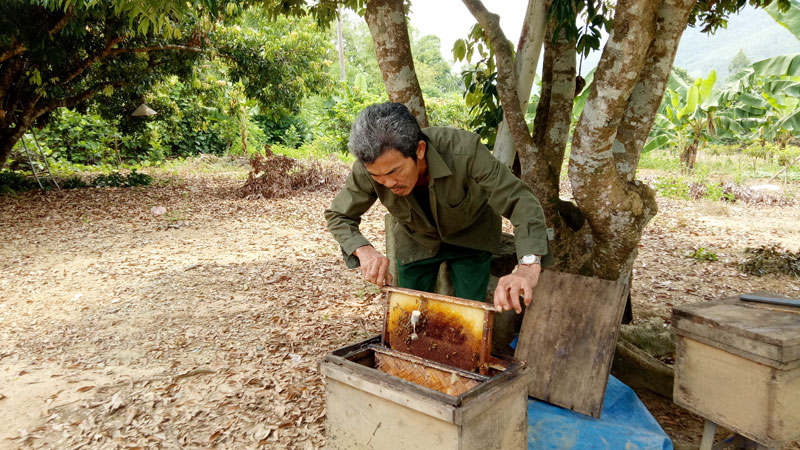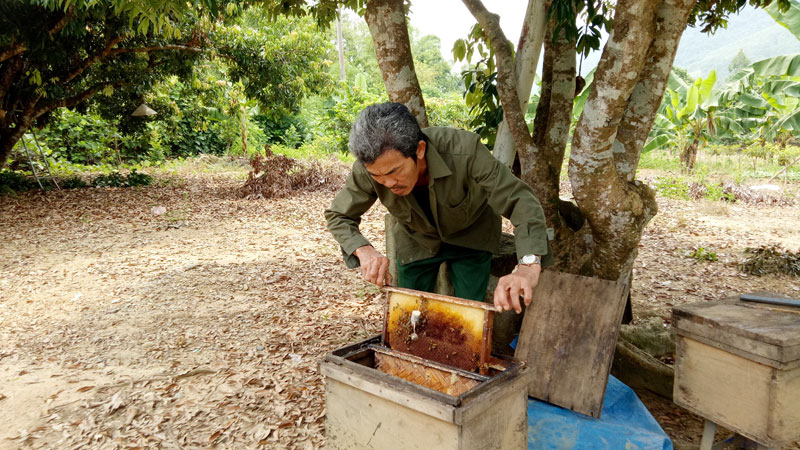
(HBO) – Thanks to preferential credits, policy beneficiaries in the northern mountainous province of Hoa Binh have expanded their business and production, built houses and encouraged learning, thus creating more jobs, raising income and contributing to sustainable poverty reduction, along with fulfilling targets of the national target programme of building new-style rural areas in the province.

With
preferential credits of the Vietnam Bank of Social Policies (VBSP), people in
Bac Yen village, Yen Mong commune (Hoa Binh city,) improve household economy,
raising their income.
With loan trust, the VBSP branch in Hoa Binh city and local organisations
built a network consisting of money-savings-and-borrowing groups, with the
participation of all communes and wards in the city, to gather poor households
and policy beneficiaries which are looking for financial sources to set up
businesses, create jobs and improve livelihoods.
The city has 163 groups and 15 transaction posts operating one designated
day of the month. The groups support people’s access to services of the VBSP,
with simple procedures and financial sources handed directly to borrowers, thus
meeting their demand and contributing to the socio-economic development and
people’s livelihood.
Hoa Binh city has carried out 12 social policy credit programmes.
As of the end of August, total loan for nearly 4,700 families reached about
92.24 trillion VND (3.95 billion USD), with 0.78 percent overdue.
The loan for clean water and environmental hygiene was more than
32 billion VND, for creating jobs 16.85 million VND, for student worth around
13.77 million VND, and for household businesses in disadvantaged areas worth nearly
8 billion VND, among others.
Thanks to preferential credit, the families were able to expand
their business, build more houses and promote learning, which in turn stabilise
and improve their lives.
The credit programmes have helped disadvantaged households send
their children to school to broaden their mind or work abroad, improving their
skills and earning stable income towards sustainable poverty alleviation.
Besides, the programmes facilitating clean water and environmental
hygiene in rural areas help many families access clean water and standard sanitation
works to improve their living conditions./.
According to data from the Hoa Binh Provincial Party Committee, the industrial production index for the first six months of 2025 is estimated to have increased by 20% compared to the same period last year. This marks the highest year-on-year growth rate for this period since 2020.
In the first six months of 2025, Hoa Binh province’s export turnover was estimated at 1.145 billion USD, marking an 18.11% increase compared to the same period in 2024. Import turnover was estimated at $ 804 million, a 17.15% increase, which helped the province maintain a positive trade balance.
The lives of the ethnic minority farmers in Tan Lac district have gradually improved thanks to the new directions in agricultural production. This is a testament to the collective strength fostered through the professional associations and groups implemented by various levels of the district’s Farmers’ Union.
With the motto the "product quality comes first,” after nearly one year of establishment and operation, Muong village’s Clean Food Agricultural and Commercial Cooperative, located in Cau Hamlet, Hung Son Commune (Kim Boi district), has launched reputable, high-quality agricultural products to the market that are well-received by consumers. The products such as Muong village’s pork sausage, salt-cured chicken, and salt-cured pork hocks have gradually carved out a place in the market and they are on the path to obtaining the OCOP certification.
In the past, the phrase "bumper harvest, rock-bottom prices" was a familiar refrain for Vietnamese farmers engaged in fragmented, small-scale agriculture. But today, a new spirit is emerging across rural areas of Hoa Binh province - one of collaboration, organisation, and collective economic models that provide a stable foundation for production.
Maintaining growing area codes and packing facility codes in accordance with regulations is a mandatory requirement for agricultural products to be eligible for export. Recently, the Department of Agriculture and Environment of Hoa Binh province has intensified technical supervision of designated farming areas and packing facilities to safeguard the "green passport" that enables its products to access international markets.



